- Home
- Gregory Maguire
The Next Queen of Heaven Page 12
The Next Queen of Heaven Read online
Page 12
It is a whole life to Jeremy, and more than adequately compensates for the frondeur that his parents show. He knows, later on when his parents separate, that his being caught in flagrante has had nothing to do with it. Years later he thinks: but we might have only been being guy-sy guys, skinny-dipping like, like soldiers in Iraq. When at last this occurs to him, though, it is too late.
Jeremy doesn’t go to his own graduation; by the following May, when he would have received his diploma, Jeremy’s friends have already matriculated. And he can’t bear to put his parents through a charade of family togetherness on his behalf. Besides, two weeks after the ceremony he skips, when he is back at the lake doing Six Nations Ice Cream one final summer since he has no job after college, a postcard comes from Willem saying they need to talk, but Jeremy should meet him someplace other than the lake. At a restaurant in Watertown. During regular dining hours. So there’ll be no combustion of romance, apparently. Jeremy has seen this coming but denied his own eyes.
It is a difficult breakup. Willem requests it. When Jeremy balks, Willem insists. To this day, this very today in the classroom, Willem has never been able to say that he doesn’t love Jeremy. That would have been so kind, if he’d only said it. But Willem has a weird code of honor that elevates truth over charity. Willem has said, over and over, “It’s not what I want, not really; you’re not who I want.” Giving Jeremy the obvious rejoinder, “I am who you want, it’s just that you just want something else more.” This Willem has never been able to deny.
He has, though, been able to say with honesty that he loves Francesca; he has loved her before laying eyes on Jeremy that day in the Student Union; he loves her still, and even more than before. He wants children. He wants a home. He wants her. “Shouldn’t you understand this,” he says to Jeremy, “you who believe in the holiness of the heart’s affections?”
Since Jeremy’s home life has imploded as well as his fantasy romance, he hardly feels in a position to argue. Miserably, Jeremy does understand it. He tries to hate Francesca Menengest, and he puts off meeting her. He won’t go to their wedding, and he has to work as hard as he can not to send some dark reminder of Willem’s past—a plastic grip from a six-pack, say, or a copy of Personal Jesus shattered into pieces with a hammer. Truthfully, he doesn’t blame Francesca for loving Willem. How could Jeremy do that? Nor, when in the first of many attempts to put this behind him, he actually brings himself to meet her, does Jeremy find her despicable. She isn’t conniving, proprietary, or superior. (She also isn’t the blonde Willem was with that day in spring.) Francesca greets him, first and every time afterward, as if he is a distant and welcome member of their family. She seems a good partner, if obsessively alert to her House Beautiful and her Children First. She seems to know that hers is a Husband Interesting—of course she knows!—and with a thoughtfulness Jeremy has to admire, she even finds a way to absent herself when Jeremy makes himself come to visit them in Syracuse.
The past, an eternal force, always abuts the present, making of it a sort of wave of perpetual anguish that never finds anything to break itself against, and so keeps searching.
But why Willem, among all the possibilities? Jeremy knew his own native reticence was compensated, in the natural order biology and God decreed, by a winning enough form, face, manner. If he’d never been drop-dead gorgeous, he’d turned some heads, attracted attention he’d not intended to seek. And nice guys, most of them. So why hadn’t he contracted the virus of first love with say, Gorgeous Gus, the gay volleyball T.A. at LeMoyne, who used to make the men’s team do calisthenics in their jockstraps? Why not the guy in Celtic Revival: Romance and Revolution, who read Yeats aloud to Jeremy as if he were Maude Gonne? Or any of the mostly straight guys in the dorm who got tanked enough to accidentally bump into him at beerkeg blasts and not stop quickly enough, signaling curiosity, a willingness to be seduced? One of them even crawled into Jeremy’s bed. Sex, maybe, but romance, the meaning of it: null and void.
Never any of them, never even close. Willem, Willem. Maybe only because of that mutuality: that he had shown up at the lake with his sudden lust timed to match Jeremy’s own, before his own had faded. The combustible romance, prominent experience as it was of sexual ingenuity and risk and thrill and playpen wrestling, had served primarily as an armature on which, for a time, something else, love valid enough to deserve the term even when sex was removed from the equation, could climb, espaliered. Could root, flower.
They’d gone to a concert once. A chorale doing R. Vaughan Williams’s Five Mystical Songs. The lyrics about the efflorescence of God’s love cut and soothed at the same time. If God’s love was eternal, then anytime anyone turned to pray, the attention was mutual. Willem, who did not indulge in the lingo of faith, seemed to feel something in the lyrics too, squeezing Jeremy’s hand and stroking it until, in the auditorium, Jeremy’s tears surged first and, wondrous shame, his come soon after.
How do you recover from that? Move on? Consign it to the Saint Vincent de Paul bin for recycled experience? Cherry-pick from its remains for song lyrics, for evidence of mistakes made, for clues to survival?
But I moved to Thebes first, Jeremy reminded himself. Sean Riley had grown up there, and Jeremy visited a couple of times. Seven years ago, when Sean rang to say his parents had heard there was a church musician’s job open in their parish, Jeremy had applied—auditioned, really—and he’d been happy to go there from his father’s new, cold condo in Utica. “Now there’s two of us,” Sean had said, “a town the size of Thebes, can you believe it?” And two became three, when Sean got a job in the paper mill and chatted up Marty Rothbard at a company pork roast one summer day.
Jeremy had dutifully met and joked and then sung with these guys, and he had tried to imagine a romance with either of them. Sean Riley was ready, always ready, and always would be; but Sean had never been a romantic interest of Jeremy’s. He couldn’t be. Sometimes Jeremy wished he hadn’t been raised on the concept of romantic love; Sean looked as if he’d be great in bed. But Jeremy’s heart was stopped: a rare condition among men, he deduced, being unable to care about sleeping with someone with whom I’m not in love.
When Francesca and Willem Handelaers decided to move to Monroe, north of Thebes, Willem had called Jeremy to ask if it was okay. “Of all the places in New York State, you have to move a dozen miles away from me?” said Jeremy. “I am supposed to believe this is just coincidence?”
But that, it seemed, was the truth. Francesca had inherited a great-aunt’s home. They had come up to clean it out before putting it on the market, and had fallen in love with it. Willem was self-employed as an indexer and, with fax modem and the Internet, could work from anywhere in New York State. Francesca was pregnant with Bartholomew. They wouldn’t do it, of course, if Jeremy was unsettled. “Of course I’m unsettled,” Jeremy had said. “I’ve spent years trying to convince myself that I always despised you. You want me to regress?”
“I don’t make demands of you,” said Willem. This was true only up to a point. Without spelling them out, Willem made demands that Jeremy restrain himself, adopt a phony breeziness, endure casual encounters like the one in school today without complaining.
Willem kept a kind of distance, but his expression remained warm and confidential. Remembering how Willem liked to talk after sex, Jeremy suspected that Francesca knew most of the story. Willem’s little tendresse—how sweet, and Jeremy such a funny puppy! Maybe it stoked some curious fires of their own marriage. But Jeremy hoped and believed that Willem had banked the richer memories of their affair in some corner that even industrious Francesca couldn’t redecorate.
So the happy Handelaers had moved dangerously near, and Jeremy had stayed out of their way, and had kept waiting all this time for the abatement of need, of grief, of the sting of rejection. As Jeremy had grown more confident as a man, as a gay man, he had at least been able to laugh at himself. Was I that lousy a lover, technically, that I lost Willem not just for myself but for all of the gay b
rotherhood? And once in a while Jeremy had accepted an invitation to a party at the Handelaers, but always when there would be a dozen or more people around, so that when Willem failed to corner him in the pantry and attack him with whiskery rough kisses, it wouldn’t seem too personal a slight. Willem was warm to everyone, as Jeremy was: that was always part of the attraction. But to see Willem with his arms around his wife and kids, or his sister-in-law or upscale Monroe friends—it took all the juice out of the memory of their passion.
Yes, passion; the word that neither Sean nor Marty could bring himself to say without using the shackling quotes of irony. And Jeremy just couldn’t bear to be another one of Willem’s hail-fellow-well-met yuppie buddies. He didn’t make enough money, for one thing, and for another he and Willem had burnished each other bright with coconut-scented massage oil and taken each other in every wrestling hold possible, and that still had to count for something, even though it was now almost a decade later.
His hands still stung; his underarms reeked. But he had returned to the present, however sorry it was. The involuntary reprise of the mothballed memory was done. For now.
As he pulled into the parking lot between Our Lady’s and the Radical Radiants, he almost ran into someone pulling out from the other direction. A young woman—he recognized her—a girl, really. That daughter of the Pentecostal woman who got bonked on the head. The girl looked angry. She jerked on the wheel and gave Jeremy the finger. He sighed, and thought, if only.
He got out his keys and went into the church. It would be too cold for Sean here, and too cold for Jeremy after a few minutes, but the surprise visit from Willem still unsettled him. He folded back the piano lid and sat down, and put his head against the music rack for a minute. Then he flexed his hands a couple of times and began to play one of his own songs. He sang quietly, not so much a performance as a confession.
“There were lilacs by the side of the lake,
And the lake was silky steel.
One can be anesthetized by beauty,
Or one can remember how to feel.
You were sitting on the floor with your head in my lap
Which you had not done before.
There were lakeside lilacs nodding from a jar.
Sometimes I do not feel you any more.”
It was the best he could do with what he had. It wasn’t Whitney Houston, but at least it was his. The only thing he had been able to salvage out of all that wreckage.
15
ABOUT CALEB, TABITHA neither knew how to believe Linda Pearl Wasserman nor how to doubt her. Linda Pearl was a true friend, as true as they came, but how true was that? Tabitha had to admit that in tenth grade she herself had counted Gemma D’Agastino as a true friend. But then Gemma started ignoring Tabitha for that stringbean transfer student, Jayden Moody, and then got all emotional and distant and maybe got pregnant and maybe had an abortion (who knew because she wasn’t talking to Tabitha any more) so the following May Tabitha had sent her a Happy Mother’s Day card. Anonymously.
Tabitha had still liked Gemma, kind of, and it had seemed funny at the time. But on reflection, what kind of true friend would behave like either Gemma or Tabitha? What did Tabitha know about true friendliness? Could Linda Pearl Wasserman be trusted? Hogan’s Magic 8-Ball said ASK AGAIN LATER four times in a row and the fifth time came out, exhaustedly, with MAYBE. SO that was no help.
Still, Caleb was weirdly absent from his usual haunts and hideouts. Maybe this Polly person had had sex with him and then had to kill him before anyone found out. Tabitha knew the feeling.
Hogan and Kirk were no help, each of them mired in some stupid high-school trauma she could care less about. Tabitha was on her own. Considering that Mom and her dissolving brain were parked in the living room and the world outside the house seemed tainted with millennial anxiety, the century was coming to a close with all the relish of a great big fart in a freezer bag.
Tabitha had taken to showing up for school long enough to be counted present by the homeroom monitor. But she skipped out before second period every day through the cafeteria’s loading dock door. She drove to Thebes’s sorry excuse for a downtown and pretended to be on errands for her mother. Shoplifting things like hairnets and rolls of chewable heartburn tablets that no teenager could possibly want. Just for practice. But really she was prowling for Caleb, store by store.
At night she walked the sidewalks. She felt she might break into every house in Thebes and find him in someone’s bed, maybe everyone’s bed. And then she might do that Polly person a favor and kill him herself. But how? Strangle him with an old lady’s hairnet?
ON TUESDAY MORNING she found herself on the block of Union Street where the two churches on separate street corners squeezed the parking lot between them. The Catholic church was bolted but the Radical Radiant Pentecostal church was open, or at least not securely locked. She hardly expected to find Caleb in a church but what the hell, miracles happen. She was rooting through the lost-and-found box looking for something peppy to spruce herself up with in case she actually ever found Caleb, and whirled about when she heard someone approaching.
“Well, then, a lost sheep rather eager to get back into the fold.”
Pastor Jakob Huyck wasn’t expecting Tabitha Scales, but he wasn’t too taken aback when he found her in the vestibule of Cliffs of Zion. He hadn’t seen her since the day her mother had gone roamin’ with the Romans—should look in on that poor deluded woman—and he had forgotten how beautiful the daughter was.
“Hi, Pastor Jake,” she said.
“Stopped by for a little private prayer, maybe?—”
As if she’d just recognized the need, she said, “Can I talk to you?”
“I live to serve.” He ushered her into his office. Huyck didn’t have a wife who lived to serve him as a secretary/receptionist. So, though none of the good ladies of the church were around yet to tut at him, he left the door of the chamber open just in case someone came along. Propriety in the eyes of the Good Lord, he reminded himself, though he knew that the Good Lord’s eyes weren’t stopped by plywood doors from Iroquois Lumber.
He was proud of his consulting room. Unlike Father Mike’s office around the corner, Huyck’s walls sported no religious posters or offensive bloody art crucifixes that made Jesus look like a poster boy for Benetton. Instead, a slim anodized aluminum cross floated ethereally on a panel of black Chinese silk that itself floated against Benjamin Moore’s Paul Revere Pewter, matte finish. A box of Kleenex was tucked behind a display of asparagus ferns that, he noted, were on their way out. Ah well. Ashes to ashes, dust to dust; it applied to houseplants as well as the baggage of the human body.
Though baggage was not quite the thing that sprang to mind when Huyck watched Tabitha fling her human body into the Danish Modern chair opposite him. She was at that early moment in the body’s hurtle toward corruption when even dandruff and peeling sunburns seem attributes of mortal beauty. She’d make such a pretty addition to his congregation. Not for the first time, Huyck wondered why a tendency to faith wasn’t transferred genetically along with snub noses and splayed feet. For Tabitha Scales, he knew to her mother’s dismay, wasn’t what you could call a devoted Christian.
Though she seemed to be trying to behave. He was touched. “Please tell me how I can help.”
As she struggled to put her thoughts into words—perhaps she’d never been asked a kind question before—he rehearsed what he knew of the family. Dear Leontina Scales, that timid good woman. A divorcée, with this girl and two or three younger sons. The kids didn’t come to service. Then Huyck remembered that for a while one kid, Kirk, had thrown himself into things. He’d taken part in the Christmas pageants for four or five years, starting as a bush and advancing through the roles of a star, a sheep with measles, a shepherd boy. The last time he had wanted to be the Little Drummer Boy and wear a ripped shirt open to the waist. “It shows my poverty,” he’d argued. In nixing that, Huyck hadn’t corrected him about what it really showed, but Kirk
hadn’t come back.
Tabitha said to him, “You know Mom. You know she had that hit on the head, and she was in the clinic over on Morse Hill Road. I think you signed for her release.”
“Yes, well. Without a secretary things get in quite a muddle. I should come by.”
“She just isn’t herself, and the goons over at the clinic don’t seem to get it.”
“What do you mean?”
“She’s just weird. I mean she does nothing but look at the Bible or TV all day long. She doesn’t go out. She hasn’t been back to church, have you noticed? And she’s mean. She didn’t used to be mean. She used to be, I don’t know, kind of sickly normal. Now she’s just sick. I have stopped by here a couple of times when I had to get out, but you’re not here at night too often. You should come and see for yourself.”
“I’ll come over. Remember, Mother is recovering; probably just needs a little time out, too. Are you able to be there for her?”
“I’m not able to get away from her. Mostly I’m scared to leave her alone. She made me promise not to bring her back to the doctor. She’s always been against doctors—says they interfere with the will of God or something. But she’s not herself. It’s spooky. You don’t know what she’s going to do next.”
Huyck remembered that Leontina Scales had always had a tough time when the unscripted Glory and Praise segment began in the church hall. She fanned herself with the music booklet and closed her eyes and moved her lips, but nothing came out, and she had never gotten up to Sway in the Spirit. But he did wonder if her current ailment was a variety of conversion experience. The TV part was perplexing. Huyck had no use for what he called the devil’s electronic moving postcard from hell. But when someone like Mrs. Scales threw herself into the Bible even more vigorously than usual, how could he be alarmed? “I will come and see her,” he told Tabitha. “I should have before. Do you forgive me?”

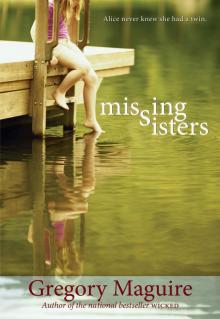 Missing Sisters
Missing Sisters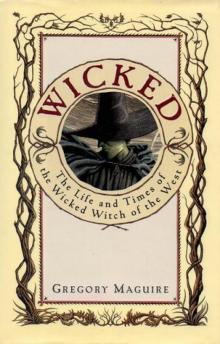 Wicked: The Life and Times of the Wicked Witch of the West
Wicked: The Life and Times of the Wicked Witch of the West After Alice
After Alice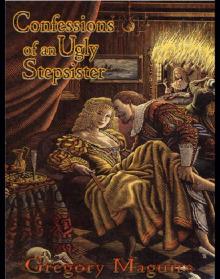 Confessions of an Ugly Stepsister
Confessions of an Ugly Stepsister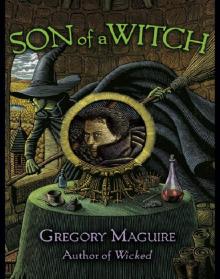 Son of a Witch
Son of a Witch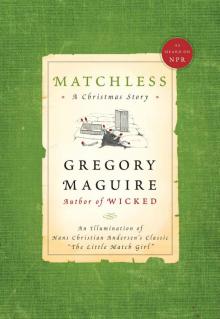 Matchless
Matchless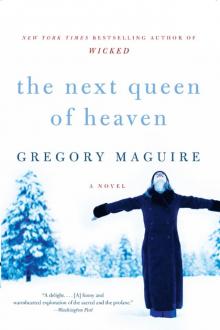 The Next Queen of Heaven
The Next Queen of Heaven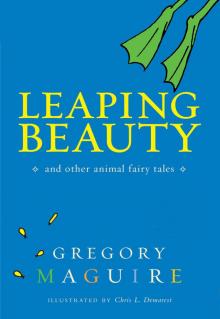 Leaping Beauty: And Other Animal Fairy Tales
Leaping Beauty: And Other Animal Fairy Tales Hiddensee: A Tale of the Once and Future Nutcracker
Hiddensee: A Tale of the Once and Future Nutcracker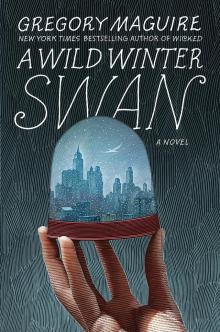 A Wild Winter Swan
A Wild Winter Swan Egg & Spoon
Egg & Spoon Out of Oz
Out of Oz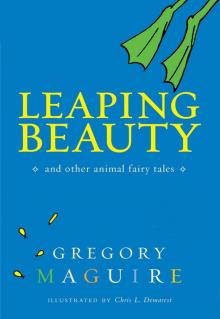 Leaping Beauty
Leaping Beauty Hiddensee
Hiddensee The Wicked Years Complete Collection
The Wicked Years Complete Collection The Next Queen of Heaven: A Novel
The Next Queen of Heaven: A Novel